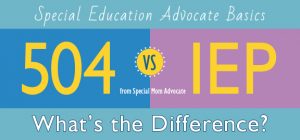 There seems to be a lot of confusion about IEP vs 504 plans. While both are covered within special education, only IEPs (individualized education programs) are covered under IDEA (Individuals with Disabilities Education Act). IDEA is the federal law that governs how special education should work. 504s are actually covered under ADA (American Disabilities Act), which is a civil rights law.
There seems to be a lot of confusion about IEP vs 504 plans. While both are covered within special education, only IEPs (individualized education programs) are covered under IDEA (Individuals with Disabilities Education Act). IDEA is the federal law that governs how special education should work. 504s are actually covered under ADA (American Disabilities Act), which is a civil rights law.
I put together this infographic that shows the many differences between IEP vs. 504. It’s actually an excerpt from Chapter 40 of my book, Special Ed Mom Survival Guide. One of the key things I share in this chapter is having good knowledge of special education law. It is one of your best tools when advocating for your child!
Major differences between IEP vs 504
The biggest difference is that IEPs have specific processes in place to ensure the school is providing the right support. These processes ensure they are following through on the support they should be providing. 504s do not have these rules so there are no safeguards to ensure that the school is providing the right support.
Oftentimes when you suggest special education to a school, they will do an evaluation. Afterwards they may come back and say the child doesn’t qualify for an IEP, but they will qualify for a 504. Sometimes when they do this it’s the correct approach for your child. Unfortunately all too often this offer is made because they know it’s easier to offer a 504, and it doesn’t cost them any money. There are fewer legal restrictions to make sure they follow the 504, which means less work to implement. While it is a violation of the ADA if they do not abide by it, not following through requires the parents to file a discrimination complaint in order to get the school to comply. Not everybody is up to the task.
This is why it is really important to understand what qualifies a student for an IEP. If you have reviewed the special education law, and you feel your child should have an IEP, then you have to fight to get it. You have to build a case that shows they are eligible. If you cannot convince the school, hire a special ed advocate or lawyer so they can help you fight.
NOTE: Blog authors, feel free to use this infographic on your site or in social media, but please link back to this original blog post.
ABOUT THE AUTHOR:
Bonnie Landau is a professional counselor and holistic therapist in Ventura County, California. Her specialities include therapy for autism, therapy for ADHD, and therapy for parenting who have kids with autism or ADHD or other neurodivergence. She changed careers from graphic design to counseling with the goal of helping struggling parents of kids with ADHD, autism, or other neurodivergence find strategies and solutions to help their children succeed. Bonnie is also the author of Special Ed Mom Survival Guide: How to Prevail in the Special Education Process and Find Life-long Strategies for You and Your Child.






